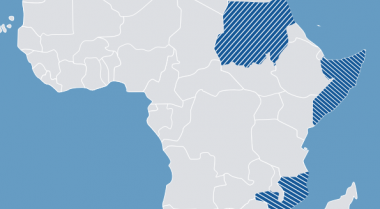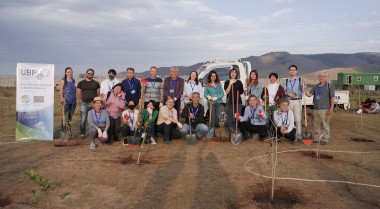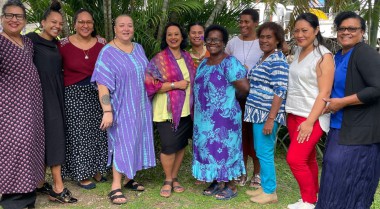
Strong and operational partnerships: Why should the UN work with peacebuilding networks?
In 2003, the UN General Assembly highlighted the importance of the GPPAC network as 'a diverse and inclusive worldwide movement [that] aims to engage civil society actors from the grass-roots to the international level' (A/57/864, para. 6). For over two decades, the GPPAC network has built upon this impetus. It has created a platform for diverse local peacebuilders, global policymakers, and the donor community to share knowledge and expertise and support each other in advancing impactful action to build and sustain peace.
The benefits of the 'worldwide movement', which grew into the GPPAC network, are clear. Few have a greater vested interest in peace than people whose lives are being held hostage by violence and conflict. Through the GPPAC network, which puts local peacebuilders at the helm of decision-making, people directly affected by conflict dynamics determine their own peacebuilding priorities responsive to the needs of their communities. In this, they work with diverse stakeholders to translate these priorities into concrete peacebuilding action.
Where do we stand in sustaining peace?
Substantial progress in supporting networks of local peacebuilders has been achieved at the global policy level. The 2020 dual UN Resolutions on Peacebuilding and Sustaining Peace (A/RES/75/201-S/RES/2558) recognise that 'peace is more sustainable when peacebuilding efforts are locally owned, led and implemented.' The UN Peacebuilding Fund (PBF) found that peacebuilding networks offer an opportunity for diverse stakeholders to access broader groups of decision-makers and provide outreach to wider local audiences for pro-peace messages across countries and regions. Further, the 2020 launch of the Community Engagement Guidelines (CEGs) provides an incentive for UN actors operating in the field to effectively engage with and harness the potential of local civil society organisations and their networks.
Despite the considerable progress in recognising the role of local peacebuilders in sustaining peace, there continues to be a limited practical understanding of how to establish and institutionalise strong and operational partnerships between the UN and civil society. Both actors aspire to deepen their engagement with each other. Civil society seeks a more influential role in shaping the agendas of key peacebuilding policy processes, while the UN aims for more sustainable and institutional engagement with civil society.
In light of this prevailing context, it is imperative to reevaluate the strategic advantages peacebuilding networks offer to peacebuilding and sustaining peace, especially at the national and regional levels.
Why should the UN work with peacebuilding networks?
We list three reasons why UN agencies and other international partners, which share the collective goal of sustaining peace, should work with peacebuilding networks in a systematic and institutionalised manner.
- Networks are diverse and extensive in their reach: Through their inclusive structure, networks engage diverse grassroots stakeholders—women, youth, indigenous groups, traditional leaders, and actors in the remotest areas—empowering the voices traditionally marginalised in peacebuilding. Networks have mechanisms to ensure that diverse groups in society contribute to peace. For example, the Pacific Women Mediators Network has a quota of 15% of young women, including women with disabilities, to participate in peace processes across the Pacific through established partnership channels with the Pacific Islands Forum (PIFs), the UN and national governments.
- Networks host a rich array of in-depth thematic expertise and know-how based on cross-regional learning and exchange. Within networks, members highly regard and acknowledge the significance of each other's distinct local and indigenous knowledge concerning peacebuilding, humanitarian and development action. In 2023, GPPAC members from Mozambique, Uganda, and Zimbabwe came together to develop a Step-by-Step Guidance Note for local peacebuilders on how to document, assess, and address climate-related security risks at the local level. By facilitating cross-regional learning and exchange, the network structure empowers members to harness diverse expertise, surpassing the capacity of any single organisation in isolation. Moreover, it provides UN partners with comprehensive context analysis informed by diverse local members' expertise.
- Networks are a safe, sustainable umbrella that brings diverse people together around a shared vision. Solidarity is the invisible but profound glue that holds network members together - in times of stability and crisis. Solidarity further contributes to building shared commitments and common goals, which presents a cohesive platform for the UN and other international partners to engage and collaborate with. Networks can facilitate collaborative efforts that persist beyond one-off consultative exchanges or exclusive sustainable partnerships with individual organisations. Networks allow for continuous engagement, enabling the UN to foster long-term systematic and operational partnerships with diverse civil society organisations.
The international community's agreement is clear: Sustainable peace requires strong and operational partnerships between the UN, other international stakeholders and civil society. The time is now to ensure diverse peacebuilding stakeholders collaborate effectively at the country level. With networks' expansive reach, diversity, and shared vision, they catalyse consistent, coherent, and impactful action towards sustaining peace.


